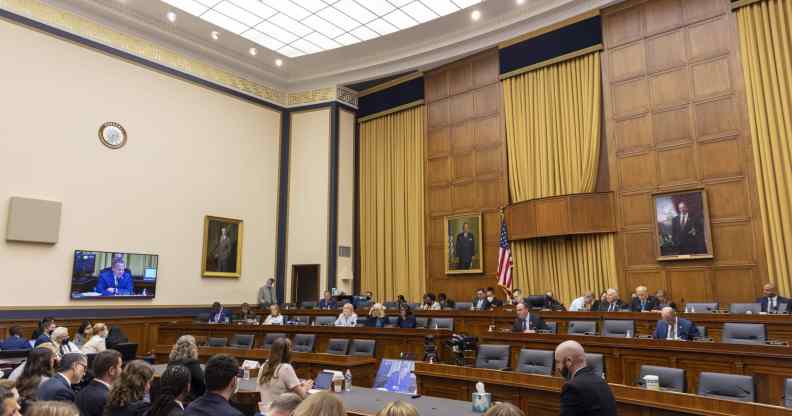Congress to vote on same-sex marriage bill amid fears Supreme Court could target it next

Chairman Jerrold Nadler (D-NY) oversees a hearing of the House Judiciary Committee on Capitol Hill on July 14, 2022 in Washington, DC. (Photo by Tasos Katopodis/Getty Images)
The US House of Representatives will vote on protections for same-sex and interracial marriages in a major test of lawmakers’ commitment to equality.
The vote has been called amid fears the Supreme Court could overturn the rulings that guaranteed marriage equality for same-sex and interracial couples, just like it did when it gutted abortion rights by nullifying Roe v Wade.
The Respect for Marriage Act would repeal law left over from the Defense of Marriage Act, enacted under Bill Clinton in 1996, which defines marriage as a union between a man and a woman. It would also provide legal protections for interracial couples.
It’s part of a slate of legislation designed to confront the Supreme Court’s conservative majority, including a bill on abortion access that has been passed by the House, but is unlikely to proceed in the Senate.
New York’s Democratic representative Jerrold Nadler said ahead of the House vote on Tuesday (19 July), per NPR: “As this court may take aim at other fundamental rights, we cannot sit idly by.”
The vote will also force lawmakers to make their views known ahead of the mid-term elections.
The bill is expected to pass in the House, but many supporters fear that the Republican-dominated Senate will stall it.
The newly introduce legislation contrasts the Defense of Marriage Act down to even its name. Human Rights Council interim president Joni Madison called the 1996 bill a “stain upon our nation” in a statement.
“The Defense of Marriage Act – which excluded legally married same-sex couples from accessing the federal rights, benefits, and obligations of marriage – is a stain upon our nation and deserves to be relegated to the trash bin of history,” she said in a statement.
“With the Respect for Marriage Act, Congress has the opportunity to right this wrong by creating an inclusive law that also standardizes the mechanism for evaluating when a marriage should be given federal recognition and affirms that public acts, records, and judicial proceedings should be honoured across this country.”
While the 1996 law was essentially sidelined by court rulings such as Obergefell v Hodges, which established a federal right to same-sex marriage, it wasn’t completely repealed.
The bill comes after Republican-appointed justice Clarence Thomas expressed a desire to revisit historical equal rights cases.
Thomas said that the Roe v Wade decision opens up the opportunity to reconsider “all of this court’s substantive due process precedent”.

Steve Marshall, attorney general of Alabama, testifies on the fourth day of the Senate Judiciary Committee confirmation hearing. (Tom Williams/CQ-Roll Call, Inc via Getty Images)
Since Roe v Wade was overturned, half of US states are poised to, or have already banned abortion. Legal challenges are being launched up and down the country.
Several states, including Alabama, have used the ruling as an opportunity to attack other rights such as those to trans healthcare or contraceptives.
The ruling’s impact has also been felt in other countries, with British Tory MP Danny Kruger claiming that women have “no absolute right to bodily autonomy” in an abortion debate in the House of Commons on 28 June.

